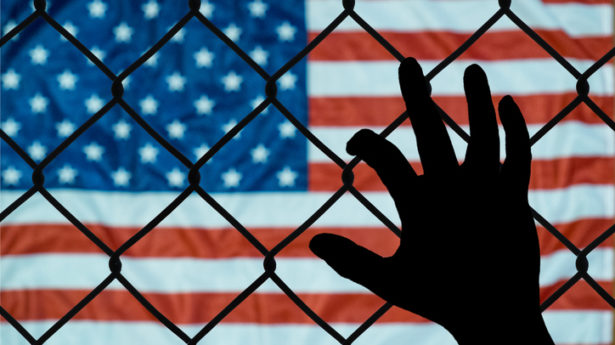The Unitarian Universalist Service Committee advances human rights through grassroots collaborations.
The Real National Emergency is Creeping Authoritarianism

By on February 25, 2019
When President Trump announced a national emergency on February 15, initial reaction rightly focused on the emergency declaration itself, and the threat it poses to our democratic institutions. Less noticed, however, yet equally concerning, were the justifications the President used to introduce this order, many of which showed disturbing affinities for contemporary authoritarian regimes.
In meandering remarks lasting almost an hour, Trump first rehashed his usual dehumanizing rhetoric about immigrants and asylum-seekers, referring to an “invasion of our country” and once again making false and stigmatizing claims about the flow of drugs and crime across the U.S.-Mexico border.
Then, in one particularly disturbing passage, Trump described an exchange with President Xi Jinping of China, in which Trump supposedly tried to convince the Chinese premier to add drug trafficking to a list of capital crimes. Trump went on to suggest that the United States should follow China’s example by making certain drug offenses punishable by death.
In doing so, Trump called for the execution of potentially thousands of people with non-violent drug convictions in both the United States and China. The passage must also be read in context of Trump’s prior remarks in which he has appeared to endorse police brutality and to encourage members of the U.S. military to use excessive force at the border—specifically by treating “rock-throwing” as equivalent to carrying a gun.
Such rhetoric is frighteningly reminiscent of remarks by populist authoritarians and demagogues in other parts of the world, such as Rodrigo Duterte and Jair Bolsonaro. Both men have recently encouraged law enforcement agencies to kill with impunity, seeming to justify a spike in extrajudicial killings and other human rights violations. Brazil’s Bolsonaro, for instance, remarked last summer that police who shoot people without trial should be awarded medals, rather than being held accountable.
So too, we ought to be deeply concerned that the president of the United States just encouraged an authoritarian regime to expand its use of the death penalty. The People’s Republic of China already has an abysmal human rights record, executing the largest number of people each year and currently holding more than a million people in concentration camps in Xinjiang province.
Trump’s sympathies with authoritarian regimes and tactics manifested a long time ago, and they have real consequences for U.S. foreign policy. We saw this last month when Trump appointed Elliott Abrams to oversee his administration’s policy on Venezuela. Abrams was chosen for this responsibility despite—or perhaps, because of—his role in illegally funneling money to right-wing paramilitaries in Nicaragua in the 1980s, supporting a Guatemalan general who was later convicted of genocide against the country’s Indigenous people, and covering up a massacre of 900 civilians perpetrated by the U.S.-backed Salvadoran military in 1981. The effects of these immoral foreign policy decisions are still being felt in Central America today and continue to drive forced displacement from the region.
In his words and actions Friday, Trump continued to follow the path of a cautionary tale that UUSC’s partners in Eastern Europe have warned us about before. Authoritarianism always begins by restricting the civil and human rights of groups that have been the most heavily stigmatized, labeled as “criminals” and “terrorists” or otherwise marked as “other.”
If authoritarianism is not confronted and defeated at this early stage, it metastasizes—threatening the rights of all other members of society as well. This is the timeless wisdom conveyed by the famous poem by the German pastor Martin Niemöller, whose words still resonate today:
First they came for the socialists, and I did not speak out—
Because I was not a socialist.
Then they came for the trade unionists, and I did not speak out—
Because I was not a trade unionist.
Then they came for the Jews, and I did not speak out—
Because I was not a Jew.
Then they came for me—and there was no one left to speak for me.
Photo Credit: iStock – Fernando Podolski

